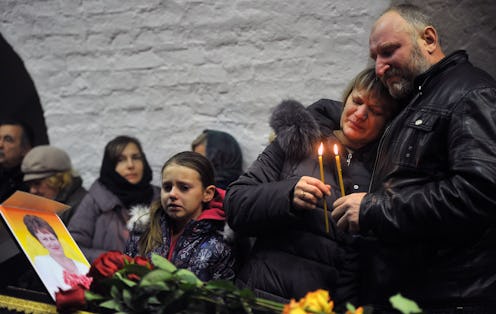New information about the Oct. 31 apparent bombing of the Russian Metrojet Flight 9268 in Egypt’s Sinai Peninsula suggests that ISIS, which initially claimed responsibility for the tragedy, is, in fact, most likely to blame — and that the operation involved a Sharm el-Sheikh airport worker. After analyzing video surveillance footage of the Egyptian airport, American aviation officials suspect a ramp worker planted the bomb before the plane ascended, according to an ABC News report.
Both airport workers and hotel employees, who worked where Flight 9268 passengers stayed, are being interviewed by Egyptian investigators and undergoing background checks. The video footage is just one of multiple pieces of evidence pointing towards the growing possibility that ISIS recruited an airport worker to carry out the operation. Electronic intercepts collected by Israel and passed along to American officials suggest that ISIS was in correspondence with someone at the Sharm el-Sheikh airport that day, also giving more viability to the prospect that ISIS is responsible for the attack.
After the initial days of uncertainty following the crash, a senior U.S. administration official told CNN that authorities are “99.9 percent certain” the jet was bombed. Although the 0.1 percent chance that the plane crashed due to other complications has yet to be ruled out, U.S. officials are becoming more assertive in their claims that ISIS is indeed responsible. U.S. Representative Adam Schiff, who helps oversee agencies within the Departments of Defense and Homeland Security, recently summed up classified briefings on the situation overseas.
ISIS may have concluded that the best way to defeat airport defenses is not to go through them but to go around them with the help of somebody on the inside.
Egypt is largely leading the investigation alongside Russia and both have refused aid from the FBI. Supervisory Special Agent Joshua Campbell told Newsweek that when allowed, America will be "ready to assist". CNN reports that although Obama suspects the crash was an act of terrorism, Egypt isn't wholly convinced.
Ayman al-Muqaddam, head of the investigation in Egypt, told CNN that all possibilities are still being considered, explaining that he "doesn’t know what happened exactly.” However, Egypt is just one of several countries involved. Other nations affiliated with the Russian Flight 9268 include Ireland, Great Britain, Russia, France, Germany, and the United States, but Egypt doesn't necessarily agree with the negative media attention they are promoting for the nation.
On Tuesday, the Egyptian state-owned newspaper Al-Gomhuria — state-owned papers are known to be biased in military nations — ran the headline "The people defy the conspiracy -- Egypt will not cave in to pressures.” Such conspiracy theories, propagated by Egyptian media, happen to coincide with the state’s refusal to fully accept the bomb theory.
According to CBS News, such theories allege that the West — America and Great Britain — is leading bomb investigations in Egypt to weaken the nation’s tourist industry and suppress President Abdel-Fattah el-Sisi. After ousting former president Mohamed Morsi and his Freedom and Justice party (political wing of the Muslim Brotherhood) from office, el-Sisi was elected on the platform of stability and protection. Since the Russian Metrojet crash killed over 200 people just 23 minutes after taking off, such stability and protection have been compromised. Given its historically relentless role in occupying Middle Eastern countries and attempting to convert them into democracies, the West is viewed as the culprit.
Regardless of theories, Sharm el-Sheikh Airport’s history of lax security is more pertinent in the international investigation. Security officials at the airport told the Associated Press that the main baggage-scanning device doesn’t run correctly the majority of the time and that entry gate searches are not thorough. They added that despite filing out security reports, the concerns have not been addressed. Another security official, who spoke to the AP anonymously, mentioned that even a 10-euro bribe to smuggle drugs or weapons is not uncommon. Currently, Egyptian media is permitted inside the airport to film security checks and baggage strips, but according to CBS News, all foreign media is now restricted from entering.
Airport security scares abroad have brought attention to American airports' scores on recent TSA safety tests. Just this week, U.S. Representative Schiff, who also commented on the Russian plane attack being an inside job, told George Stephanopoulos that lax security is also a problem at home, and that when it’s tested, the TSA fails. Earlier this year, undercover investigators were successful in smuggling mock explosives in 95 percent of trials. A more recent test conducted by the Homeland Security Inspector General shows that security measures have actually worsened as the TSA failed 67 out of 70 tests.
However, it's unlikely that a Sharm el-Sheihk "inside job"could be repeated in the United States, where TSA officers undergo intense background checks. And it's important to remember that some airport employees, such as baggage handlers, are actually employed by airlines, not the government. In the days following the TSA tests, airlines, such as United Airlines whose spokesman expressed the airline's commitment to safety in an interview with The Daily Herald, realize the high level of cooperation between the TSA and commercial airline personnel required to keep passengers safe.
We are working closely with the Transportation Security Administration and all available intelligence sources, and we will continue to follow their guidance on the appropriate security procedures at airports we serve.
The Russian plane bombing in Egypt may have caused increased flying-related anxiety, but both Egyptian and American airports are eager to make sure such attacks don't happen again.
